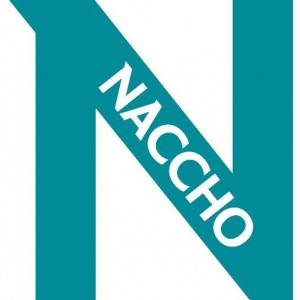
Members of Ramsey County’s Community Environmental Health team. From L-R: Caleb Johnson, Nicole Skatrud, Baigal Tsolmon, Lori Green, Kaylie Prochaska, and Mike Crider. (Photo credit: Ramsey County Environmental Health)
This guest post was written by Minette Saulog and Zitlali Ayala, Environmental Health Specialist Fellows, Saint Paul - Ramsey County Public Health.
Why would an environmental health division’s food safety regulatory program be interested in discounting license fees for food waste diversion activities? Food waste diversion can reduce food insecurity by redirecting food to combat hunger locally. Existing programs and relationships can also be leveraged to drive innovative public health and environmental protection initiatives.
How It Started
Ramsey County’s Community Environmental Health (CEH) program licenses food establishments throughout Ramsey County, Minnesota. CEH staff know that a large portion of what ends up in the trash is food waste. Reducing food waste can have a positive environmental impact. According to the U.S. Environmental Protection Agency (EPA), Americans generated almost 41 million tons of food waste in 2017. All but 6.3% of that went into landfills or incinerators.
Many food establishments are already reducing food waste They do this by diverting food waste to hunger relief organizations (food to people), to animal producers to be used as feed (food to animals), and/or to organics recycling programs (food to compost). In 2019, Ramsey County’s CEH started offering a 10% reduction in license fees as an incentive to businesses that participate in a food waste diversion program and to encourage others to give it a try.
How It Works
The county’s Food Waste Diversion pilot program started in October 2019. All licensed food establishments received an email with the program application and instructions. To be eligible for their license discount, establishments needed to document participating in any of the following food waste diversion programs:
- Hunger relief agencies (food shelves, food banks, free meal services).
- Animal producers (food-to-hogs or other farm animal feeding).
- Organics collection by a waste hauler (food scraps to composting).
Establishments not already participating in any of these programs could apply for the discount if they started a new food waste diversion program on their own, or if they set up a site visit with BizRecycling. BizRecycling is a program of Ramsey/Washington Recycling & Energy, a joint-powers organization of Ramsey and Washington counties. BizRecycling offers grants and technical assistance to help businesses start up recycling systems (including organics).
How It’s Impacted Businesses
Most establishments told CEH staff they were drawn to the program for environmental, not financial reasons. Through this program, CEH staff connect with food establishments beyond their usual regulatory inspection roles. By focusing on food safety, security and redistribution or disposal, this program helps CEH and local businesses work towards improved local public health outcomes.
“Food insecurity is a food safety issue. When people experience hunger due to food insecurity, they might take risks like eating food that is expired or that comes from an unsafe source.”
– Caleb Johnson, Environmental Health Supervisor and CEH Manager
Johnson said it’s a win-win-win for the business, the community and the environment. “They can safely feed someone who is hungry and prevent unnecessary waste.”
2019 Food Waste Diversion Program by the numbers:
- Total license revenue discounts $4102.25.
- Average license discount: $58.50.
- License discount range: $24.50 (limited school food service) to $304.10 (large grocery store).
- Overall participation rate: 5.6% (48/856) of all licensed food and beverage establishments.
- Rates of program participation by type (eleven licensed establishments participate in multiple programs):
- Hunger relief agencies: 52% (25/48).
- Animal producers: 60% (29/48).
- Organics recycling: 38% (18/48).
- Primary reason for participating: environmental stewardship.
The Future
Through surveys, focus groups, and other engagement, CEH staff will collect feedback from food establishments on the program’s pilot year to:
- Learn why some establishments chose not to participate and others decided to apply
- Evaluate the effectiveness of outreach methods.
- Gather feedback about the application process
This information will help CEH improve the next year’s program. This could include:
- Conducting earlier, more frequent messaging by including program information in newsletters and other communications.
- Opening applications 1-2 months earlier, allowing establishments more time to choose or start program(s).
- Providing projected savings to show licensees what they’d save by participating.
- Allowing licensees to “stack” discounts when participating in multiple programs.
- Or using the EPA’s Waste Hierarchy to offer tiered incentives based on how environmentally-beneficial programs are.
- Giving establishments interested in food donation a list of local hunger relief agencies and their missions/values, helping them to find and work with organizations that share their values or goals.
- Strengthen partnership with the BizRecycling program and benefit from their reach and connections with the local community.
Ramsey County Environmental Health staff hope to see food waste diversion programs successfully implemented in other regions. Ramsey County’s neighbor, Washington County has already shown interest in developing a Food Waste Diversion program of its own. Ramsey and Washington counties are sharing resources and case studies on the current program, as well as discussing improvements or adjustments to address differences between the counties. Using those tools, they can build appropriate strategies to conduct outreach with establishments and administer their own version of the food waste diversion discount for program success.



